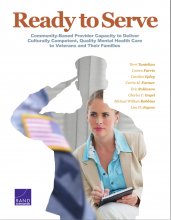By the Numbers - Nov. 17, 2014
13%
The percentage of civilian behavioral health providers surveyed the RAND Corporation who "met all the readiness criteria" to serve veterans and their families, according to a new report -- Ready to Serve: Community-Based Provider Capacity to Deliver Culturally Competent, Quality Mental Health Care to Veterans and Their Families. The researchers found that:
Licensed counselors, clinical social workers, psychologists, and psychiatrists in the sample varied in their knowledge and cultural competence to treat veterans and their families, the survey-based RAND study showed. Providers were asked, for example, what they knew about military ranks, slang, deployments, services, and other information and experiences common to veterans and their families. Only 1 in 4 (or 25 percent) of those responding to the online questionnaire reported being very familiar with general and deployment-related stressors for service members and veterans; only about one-third had prior training in military culture; and fewer than one-fifth had high military cultural competence.
As might be expected, the researchers said, "(P)roviders who work for or had experience with the Department of Defense (DoD) or the Department of Veterans Affairs (VA) reported the greatest cultural competence to work with veterans or their families as patients." Some 6% of those surveyed reported having served in the military.
13%
The percentage of civilian behavioral health providers surveyed the RAND Corporation who "met all the readiness criteria" to serve veterans and their families, according to a new report -- Ready to Serve: Community-Based Provider Capacity to Deliver Culturally Competent, Quality Mental Health Care to Veterans and Their Families. The researchers found that:
Licensed counselors, clinical social workers, psychologists, and psychiatrists in the sample varied in their knowledge and cultural competence to treat veterans and their families, the survey-based RAND study showed. Providers were asked, for example, what they knew about military ranks, slang, deployments, services, and other information and experiences common to veterans and their families. Only 1 in 4 (or 25 percent) of those responding to the online questionnaire reported being very familiar with general and deployment-related stressors for service members and veterans; only about one-third had prior training in military culture; and fewer than one-fifth had high military cultural competence.
As might be expected, the researchers said, "(P)roviders who work for or had experience with the Department of Defense (DoD) or the Department of Veterans Affairs (VA) reported the greatest cultural competence to work with veterans or their families as patients." Some 6% of those surveyed reported having served in the military.

